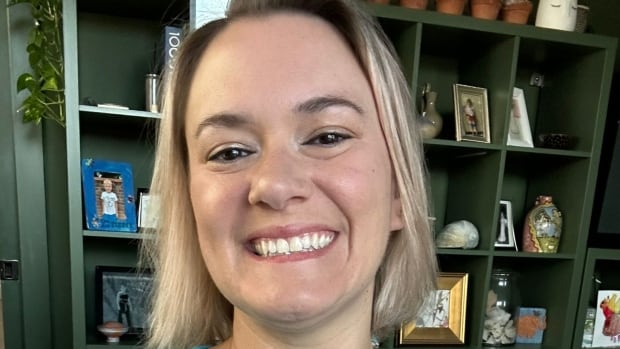
As It Happens6:35Why this Democrat is running a race she knows she can’t win
Kate Barr is 100 per cent certain she’s not going to win her state Senate race in North Carolina, but she isn’t about to let that slow her down.
Barr — the self-declared “losing candidate for state Senate District 37” — is running for the Democrats in a district that’s all but guaranteed to elect a Republican.
Despite that, she’s out there every day, knocking on doors, handing out swag, doing speeches and chatting up voters in the district of North Carolina Piedmont.
“If I’m going to lose, I might as well do it spectacularly,” she told As It Happens host Nil Kӧksal.
‘Voters are supposed to be the ones in charge’
For Barr, losing is the whole point.
She rocks campaign shirts with slogans like “Clear Eyes, Full Hearts, Can’t Win,” or simply “LOSER” in all caps. Her campaign website is called KateBarrCantWin.com.
Her goal, she says, is to bring attention to the issue of gerrymandering, the process of manipulating electoral boundaries to favour a particular party, candidate or demographic.
Republican gerrymandering in North Carolina, she says, has left many voters disenfranchised, because they know their vote won’t make a difference. In essence, she says, politicians are choosing their voters instead of voters choosing their politicians.
“I really believe that people need to see on-the-ground experiences related to gerrymandering,” she said. “Voters are supposed to be the ones in charge. That’s what it means for us to have a democracy. And I would like us to have a representative democracy.”
Barr’s opponent, Republican incumbent Sen. Vickie Sawyer, did not respond to a CBC request for comment.
Why gerrymandering is such a problem in the U.S.
Shawn J. Donahue, a political scientist who studies gerrymandering and voter rights at the University of Buffalo, says this has long been a political issue in the U.S. because, in most states, legislatures are responsible for drawing electoral boundaries.
That’s different than in many other democracies around the world, where non-partisan, third-party organizations do this work. In Canada, for example, independent commissions routinely evaluate election boundaries at both the provincial and federal level.

But when the party in power is drawing the map, Donahue says it’s a recipe for trouble.
“The thing I always ask my class is, like, if you and your buddies know that you are going to always completely control some group or board or thing that you’re in, why would you ever voluntarily give up that power?” he said.
He says there’s little recourse for those wishing to challenge gerrymandered maps, unless they can prove they violate the federal Voting Rights Act by, for example, curtailing the voting power of Black people. There are currently three lawsuits winding through the courts accusing North Carolina Republicans of doing just that.
Gerrymandering is not limited to Republicans. Electoral maps in Illinois, for example, widely favour Democrats, says Donahue.
But, as it stands today, twice as many legislatures in the U.S. favour the Republicans, according to a 2023 study by the Center for Politics at the University of Virginia. And in North Carolina, the Republican advantage is particularly stark.

The state’s Senate and congressional maps a both received an F grade from the Gerrymandering Project, a non-partisan group from Princeton University that aims to “understand and eliminate partisan gerrymandering at a state-by-state level.”
The Brennan Center for Justice, a non-partisan policy and law institute, says North Carolina has “one of the two most extreme congressional maps currently in place” — one in which Democrats, “even under the rosiest of foreseeable scenarios,” could win, at most, four of 14 seats.
In 2022, the North Carolina Supreme Court deemed partisan gerrymandering a violation of the U.S. constitution, and tossed a proposed electoral map that would have favoured the Republican Party. Under a new, court-drawn map Democrats and Republicans each won seven seats in the 2022 midterms.
But in 2023 — the same court, having gained two Republicans to form a conservative majority — reversed its decision.
“The new Republican majority … basically said the legislature can do whatever it wants to as far as partisan gerrymandering,” Donahue said. “And, well, that’s what they did.”
Why bother?
The Democrats have been pushing a strategy in North Carolina and elsewhere running candidates even in districts they know they can’t win, reports the Washington Post. Donahue says this could help energize their voters heading into the U.S. presidential election, while also putting fundraising money in the party’s coffers.
But Barr stands out among her colleagues by making gerrymandering the focal point of her run.
“I’m the only one who’s running explicitly as someone who can’t win,” she said. “I’m having a pretty good time doing it, just to tell the truth. I don’t know that every candidate would say that, but it’s really fun.”
And despite what her sweatshirt says, she doesn’t feel like a loser at all.
“One of my neighbour’s daughters was asking her mom why I was running and saying I couldn’t win. She thought it was, like, that I didn’t believe in myself or I wasn’t trying hard. And so her mom taught her about gerrymandering,” she said.
The fifth-grader was so horrified by what she learned that Barr says she spent weeks getting people to sign her petition calling for an end to gerrymandering.
“And, like, that’s the mission, right?” Barr said. “Honestly, I have already won.”